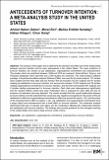DSpace Repository
ANTECEDENTS OF TURNOVER INTENTION: A META-ANALYSIS STUDY IN THE UNITED STATES
- DSpace Home
- →
- Web Of Science
- →
- Web Of Science
- →
- View Item
JavaScript is disabled for your browser. Some features of this site may not work without it.
| dc.contributor.author | Ahmet Hakan, Ozkan
|
|
| dc.date.accessioned | 2024-05-02T08:08:46Z | |
| dc.date.available | 2024-05-02T08:08:46Z | |
| dc.date.issued | 2020 | |
| dc.identifier.issn | 1212-3609 | |
| dc.identifier.uri | http://hdl.handle.net/11547/11658 | |
| dc.description.abstract | The purpose of this paper was to determine the direction and effect size of the relationships between turnover intention and its main antecedents in the United States. The main predictors of turnover intention are chosen as job satisfaction, organizational commitment and empowerment. The studies which are published between 1998 and 2018 are reviewed. Science-Direct, Scopus, and Pro Quest databases were searched and 2.356 studies are screened. The meta-analysis software package, Comprehensive Meta-analysis Software (CMA), was used for the meta-analysis. 101 studies were suitable and the three data sets are formed: first set included 312,261 subjects and 91 studies relating job satisfaction to turnover intention, the second set included 13,502 subjects and 29 studies relating organizational commitment to turnover intention, and the third set included 997 subjects and 5 studies relating empowerment to turnover intention. Each data was heterogeneous significantly and the random effects model was used. Publication bias is analyzed for each data set and no evidence of publication bias was detected. The results revealed that the overall relationship between turnover intention and the selected three constructs was negative and significant: the power of the job satisfaction's effect and organizational commitment's effect are almost the same (-.52), and the power of the empowerment's effect is weaker (-.22). Job satisfaction and organizational commitment have a large impact and empowerment has a small effect on turnover intention. The moderator analysis determined that type of industry and region are the moderators affecting the relationship between job satisfaction and turnover intention. The findings also provide guidance for the managers working in the United States who need to keep turnover under control. | tr_TR |
| dc.language.iso | en | tr_TR |
| dc.title | ANTECEDENTS OF TURNOVER INTENTION: A META-ANALYSIS STUDY IN THE UNITED STATES | tr_TR |
| dc.type | Article | tr_TR |
Files in this item
This item appears in the following Collection(s)
-
Web Of Science [1152]
